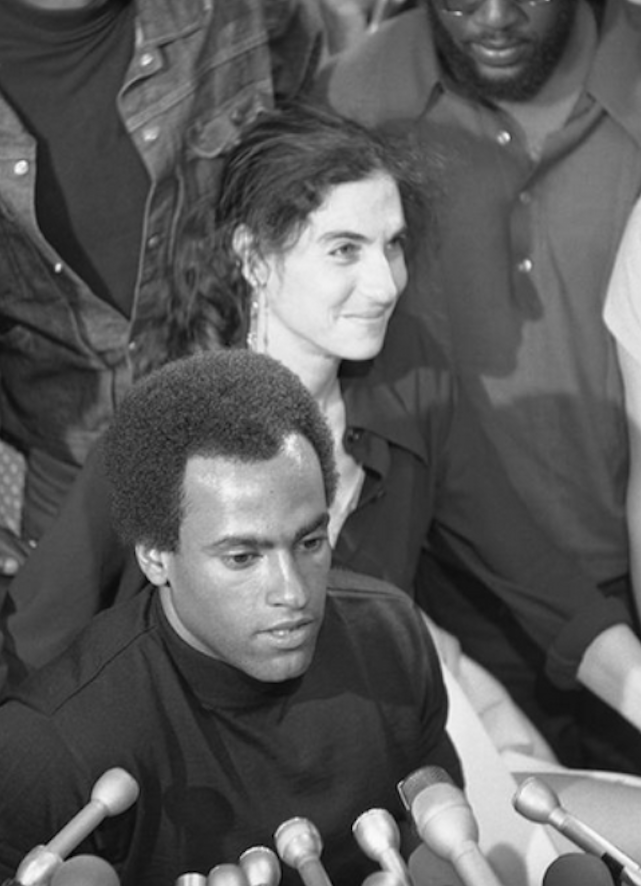By Lynn Burnett
Born in 1932, Fay Stender was raised in Berkeley in a middle-class Jewish household, by parents who dreamed of her being a concert pianist. At age 14 she was playing for the San Francisco Symphony: but it wasn’t the life Fay wanted. She studied literature in college in the 1950s, where she witnessed professors being redbaited and fired. Witnessing the antidemocratic McCarthy era as a student led her to conclude that the stories she had been taught in school about American freedom and justice were falsehoods. She became radicalized, changed her major to law, and graduated with a law degree from the University of Chicago. While studying there, she set an intention to walk regularly through the segregated slums of Chicago on the outskirts of the university, in order to expose herself to realities her otherwise privileged life prevented her from being aware of.
After college she returned to the Bay Area. The Student Nonviolent Coordinating Committee had entered its Black Power phase, and Fay began doing legal work for them. Then, when Black Panther Party cofounder Huey Newton was accused of murdering a police officer in 1967, Fay became his lawyer. She played a major role in overturning his conviction. In the run-up to the trial, Fay visited Huey regularly in prison, and Huey told her about another member of the BPP who had been charged with killing a prison guard at Soledad Prison. That was George Jackson, who was being held in solitary confinement due to his ability to organize and revolutionize other prisoners. When Fay first visited him, she was shocked by the conditions and the dehumanization she witnessed there: she, as a Jew, called Soledad “America’s Dachau,” referring to the Nazi death camp originally constructed to hold political prisoners. Fay and George Jackson began a correspondence. Soon afterwards, she arranged for Jackson’s prison letters to be published as Soledad Brother: The Prison Letters of George Jackson, and recruited the French literary giant, radical, and Black Panther supporter Jean Genet to write the introduction. The book became a phenomenon and skyrocketed George Jackson to fame.
It wasn’t only George Jackson who leaped into celebrityhood: so did Fay Stender. Thousands of prisoners now asked for her representation, leading her to found the Prison Law Project. During this time, however, her relationship with George deteriorated when she refused to help him break out of prison. She abandoned his case in 1971. Six months later, he attempted an escape and was killed. In the anger over George Jackson’s death, many of his supporters came to see Fay as a traitor. Feeling like her work advocating for prisoner’s rights now put her in danger, she closed the Prison Law Project and refocused her legal work on women’s rights. Then, in 1979, a man who believed she had betrayed George Jackson broke into her house, tied up her family, and forced her to write the following words as he held a gun to her head: “I, Fay Stender, admit I betrayed George Jackson and the Prison Movement when they needed me most.” He then shot her six times in the form of a cross through her body, although the bullet aimed at her head only grazed her skull. Fay survived, although she was paralyzed from the waist down. Fearing further attempts on her life, she fled to Hong Kong, where she took her own life a year later.
Additional Resources
Book
Lise Pearlman: Call Me Phaedra: The Life and Times of Movement Lawyer Fay Stender.
Articles
NYT, article from 1979: Black Convicts Linked to Plot To Kill Lawyer.
NYT obituary: Fay Stender is Dead; Activists Attorney Collapses in Hong Kong at Age 48 – Defended Huey Newton and Backed Prison Reforms.
Douglas Perry: Why Reedie and radical lawyer Fay Stender fought for prison reform — and paid with her life.
Jonah Raskin: Warriors Not Victims: George Jackson and Fay Stender.
Diana Russell (a friend of Fay Stender): Fay Stender and the Politics of Murder.
Wikipedia entry.
Video
Area Television Archive: Interview with Fay Stender.
